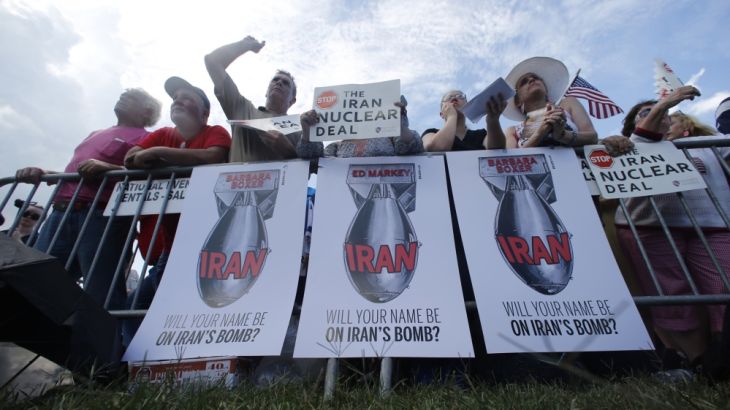
Iran, nukes and Trump: Is war likely?
We debate whether the Iran nuclear deal needs fixing, and speak with former President of Malawi Joyce Banda.
In this week’s UpFront, we speak with the former president of Malawi, Joyce Banda, about aid, corruption and democracy in Africa.
In Reality Check, we highlight the fact that there are no checks or balances when it comes to US President Donald Trump‘s sole power to launch nuclear weapons.
Keep reading
list of 4 itemsIsraeli attack on nuclear sites to prompt tit-for-tat, pursuing nukes: Iran
Bombs and viruses: The shadowy history of Israel’s attacks on Iranian soil
Republican congressman suggests nuking Gaza
And in the Arena, we debate the rights and wrongs of the Iran nuclear deal.
Headliner: Joyce Banda – Africa is not poor
Joyce Banda became the first female president of Malawi, second in African history, when she took office in 2012 following the death of President Bingu wa Mutharika.
In this week’s Headliner, Mehdi Hasan asks the former Malawian president Joyce Banda about aid and development, as well as the allegations surrounding the $250 million corruption scandal known as “Cashgate”.
“I don’t have to clear my name,” says Banda, who is now a member of Club de Madrid, an assembly of former presidents and prime ministers who continue to support and foster democratic values and leadership.
“Because Malawians know what I did, and my conscience is very clear … and that I will continue, for as long as I live, to raise my voice against corruption.”
When asked if she would run for president again following her re-election loss in 2014, Banda says she is at the will of the people.
“If they want me to run again I’ll run again, it’s not a priority for me. It doesn’t matter. I believe that if a leader, and you’re serving your people, you don’t have to be in state house. You can serve your people at any level at any rate,” says Banda.
Asked about why she argues that Africa needs more trade, Banda stated: “Africa is not poor. We are rich in our natural resources. So what we need to do, in my opinion, is to set our priorities right. Is to sit down and say how can we best use our natural resources for the benefit of our people?”
At the time of her presidency, Joyce Banda was named one of the 100 most influential people in the world by various publications.
Reality Check: Trump and the nuclear codes
North Korea fired another intercontinental ballistic missile on November 29th, once again ramping up tensions with countries in the region and also the United States. And with fiery rhetoric growing between US President Donald Trump and North Korean leader Kim Jong Un, many are starting to assess the possibilities of an actual nuclear war.
So, if there’s quick escalation and the US president decides to unilaterally launch a nuclear weapon, is there anything that can stop or delay Donald Trump from launching nuclear weapons?
In this week’s Reality Check, we shed light on the lack of clear safeguards that would prevent Trump from ordering a unilateral nuclear attack.
Arena: Is the Iran deal set to unravel?
While the Iran nuclear deal was hailed as a “triumph of diplomacy” by its supporters around the world, US President Donald Trump called it “the worst deal ever”. He recently decided to officially “decertify” the deal formally known as the JCPOA, the Joint Comprehensive Plan of Action, between Iran, six world powers and the EU – an action that now moves the deal to the US Congress.
So, as the landmark deal hangs in the balance in the US, what will the effect be on the other signatories? Is the deal fixable as some argue? And would the deal’s unraveling lead to war in the region?
“I think that the JCPOA lacks in two major things. First of all, it does not include Iran’s terrorism, support of terrorism throughout the region,” says Danny Ayalon, former Israeli Deputy Foreign Minister. “And the second thing is the ballistic missiles, that they continue to test …This creates a very, very dangerous situation.”
Trita Parsi, author of the new book Losing an Enemy: Obama, Iran and the Triumph of Diplomacy, is concerned that attempts to fix the deal will actually destroy it and could lead to war.
“I’m very worried that the trajectory of things is going in that direction, and that the measures that are being argued here as fixing the deal will end up, whether intended or not, to kill the deal.” says Parsi, who is also founder and president of the National Iranian-American Council.
“And once we have no deal, we’re back to the situation that existed in 2013, in which everything is pointing towards either acquiescing to Iran’s nuclear programme, or going to war.”
In this week’s Arena, Trita Parsi and Danny Ayalon debate the good and bad of the Iran nuclear deal.
Follow UpFront on Twitter @AJUpFront and Facebook.